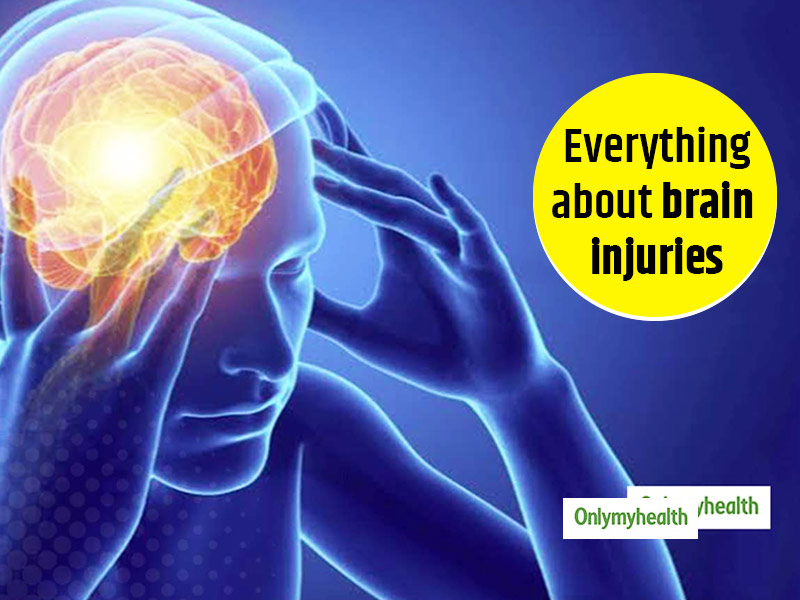
Brain injury is mostly caused by a violent episode or accidents that hits harshly and directly on the head. It can also occur due to an object that goes through the brain tissue, such as a bullet or broken piece of skull. Mild traumatic brain injury can affect your brain cells temporarily. Serious traumatic brain injuries can result in bruising, torn tissues, bleeding and other physical damage to the brain. These brain injuries can even lead to serious long term complications and can be fatal too. As it is the Brain Injury Awareness Month 2021, Onlymyhealth editorial team talked to Dr. Pawan Goyal, Senior Consultant, Neurosurgeon, Artemis Hospital, Gurgaon, about the types, symptoms, causes, diagnosis and treatment of brain injuries.
Table of Content:-
Brain injury types
According to Dr. Pawan Goyal, there are many types of brain injuries but the two main types are:
1. Traumatic brain injury

Traumatic brain injury or TBI is the most common type of brain injury, that has several cases everyday. This means an injury to the brain caused by a trauma directly to the head. There are several causes of brain injury such as road accidents, violence and falls at home or outside. The negative impacts of a traumatic brain injury depend on many factors including the type, location and severity of your injury.
2. Acquired brain injury
Another type of brain injury is acquired brain injury which includes all the cases in which the brain injury does not occur as an adult but was present since birth, and includes traumatic brain injury as well as tumor, stroke and brain hemorrhage, among others. The effects of this brain injury are mostly similar to those of traumatic brain injury, but there are some differences that make treating and dealing with acquired brain injury different.
Also read: National Winter Sports Traumatic Brain Injury Awareness, Know Types and Tips For Prevention
Brain injury symptoms
Traumatic brain injury can have both physical and mental damage symptoms. Some signs or symptoms might occur immediately after the brain injury, while some might be noticeable a few days or weeks later. According to Dr. Pawan Goyal, here are the main symptoms of brain injury:
- Headache
- Nausea
- Vomitting
- Dizziness
- Blurred vision
- Ringing in the ears
- Unconsciousness
- Mood swings
- Memory problems
- Depression
- Sleeping difficulty or oversleeping
- Intellectual problems

What causes brain injury?
Even serious traumatic brain injuries can have signs and symptoms of any mild or minor brain injury. The visibility of symptoms also varies from one case to the other. Traumatic brain injury mostly occurs because of a blow or other traumatic injury to the head or body. The severity of damage to the brain depends on the location, nature and force of impact. As per Dr. Pawan, here are the main causes of brain injury:
- Road accident
- Falling from somewhere
- Sports injury
- Domestic violence or assaults
- Blasts or fighting (army) injuries
Also read: Obesity Linked to Traumatic Brain Injury
Brain injury diagnosis and treatment

Brain injuries are mostly emergencies and require immediate medical or surgical treatment. In the case of more serious traumatic brain injury, the consequences can worsen rapidly if left untreated and ignored. Doctors have to make a complete diagnosis as soon as possible. There is a Glasgow coma scale, which is a 15-point test that helps your health care professional in determining the severity of the brain injury by checking a person's ability to listen to various instructions including directions and moving eyes and other parts. Speech abnormalities can also help in doing a proper brain injury diagnosis by the doctor.
Brain injuries mostly do not require any course of treatment other than rest and pain relievers for headaches. But, a person with mild traumatic brain injury usually has to be observed or monitored closely at home for any persistent, worsening or new symptoms, be it physical or psychological. Emergency care for moderate to severe traumatic brain injuries aims on providing enough oxygen and the correct blood supply, maintaing optimum blood pressure and preventing any future injuries on neck or head to all the people. Emergency surgeries might be required for less additional damage to brain tissues. Some medicines can help in relieving pain and numbing the injured area.
Read more articles articles on Mind and body
Also watch this video
How we keep this article up to date:
We work with experts and keep a close eye on the latest in health and wellness. Whenever there is a new research or helpful information, we update our articles with accurate and useful advice.
Current Version